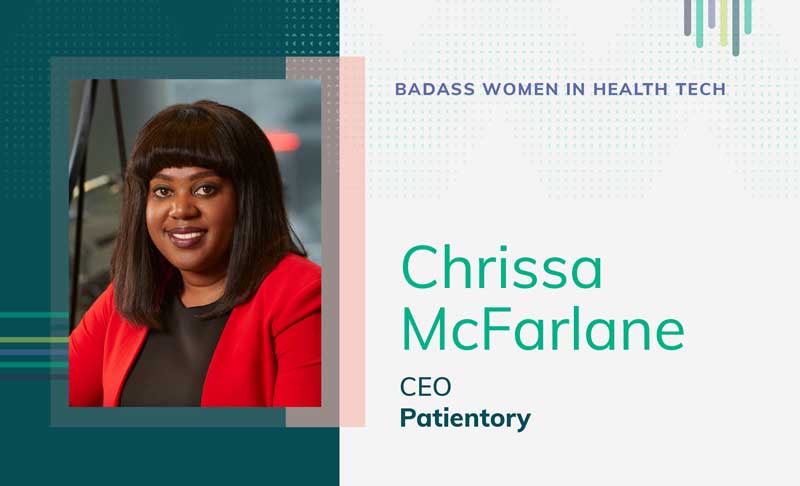Badass women in health tech: Chrissa McFarlane, CEO of Patientory
Aug 30, 2017

Earlier this year, Chrissa McFarlane made headlines for raising $7.2 million in three days via online blockchain token sales of her company Patientory. Just under 2,000 investors placed their bets on the blockchain-based distributed EMR storage computing platform.
McFarlane has been making a name for herself in the health tech space as a young female founder working to eliminate siloed, centralized EMR systems through her technology. We caught up with her for an inside look at her journey thus far.
You’ve had a pretty extensive background in the healthcare space. What initially drew your interest? I’ve been working in healthcare for 10 years. I started in high school doing research at the Albert Einstein and went on to Cornell [University] where I got a chance to do research at the USDA. Initially, I was pre-med; however, I wanted to build a business acumen and didn’t want to spend my life in a lab. So I went on to attend Wake Forest, earned a graduate business degree, and consulted for CEOs of healthcare companies in North Carolina in electronic medical record implementation.
At the time, the government was funding the adoption of electronic healthcare systems.
My last position was leading a team for a digital health tech company based in New York. In that role, I served over 3,000 employees in the tri-state area with navigating their health insurance and providing them clinical resources.
I was there for a year before transitioning to start Patientory because I saw a need for patient-centric, holistic mechanisms for the health industry to share and access information easily.
What was your entrepreneurial experience before launching Patientory? My entrepreneurial experience spans back from when I was a teenager and helped build my family's restaurant in New York City. My family are immigrants from the Caribbean. Being in a household where I saw them start businesses, entrepreneurship was part of my background.
Can you talk about how Patientory helps clinicians manage information and data from other healthcare organizations and why this is significant? Patientory helps clinicians and healthcare organizations by giving them access to a patient's complete and up-to-date medical history. Up until now, they've been reliant on a patchwork of incomplete or incompatible record systems. Patientory takes a "bridge" approach and plugs into all of the largest EMR's in use today (e.g. Cerner, Allscripts, and others).
It’s been almost two years since you launched and you’ve funded your company quite unconventionally. What other methods have you used to build Patientory? Initial funding came from family and personal savings early on. We participated in a couple of accelerators, including one in Colorado that lasted 12 weeks and included mentorship from physicians, a demo day, pitch event, and seed capital.
We also participated in a women’s startup lab in San Francisco, built relationships, and won startup battles. At the time, it was tough, because we were trying to convince investors why they should take a risk with us when we had minimal product to show.
Eventually, we came back to Atlanta, worked on building the team, and worked on the business. Getting funding for emerging technology was super hard and we needed to support development and significant capital to execute.
That’s when we turned to token sales. They’re the way 90 percent of blockchain companies fund their companies and offer the best way to get maximum interest in your project from a community.
You’re based in Atlanta—a high-growth technology community. Can you talk about how the growing tech environment in the city has played a role in the development of your business from a talent and perspective? Atlanta is a fantastic environment to start and grow a company. Whether it's making introductions, or serving as a mentor, there is a refreshing attitude of "how can I help?". There’s also a strong diversity initiative that doesn't seem to exist in quite the same way in other cities.
What have been some of your most pressing roadblocks and how are you thinking through solutions to overcome them? The biggest roadblock has been an issue of education. How do you explain blockchain to a non-technical audience? This has been a fun challenge to have, and we've met it full-on by answering people's questions, hosting webinars, uploading blog posts, and more.
---
Health tech is a rapidly growing field, and we're passionate about featuring the female perspective in this industry. If you'd like to read about more bad ass women in health tech, be sure to check out a few past installments of this series by clicking here, here, and here.
